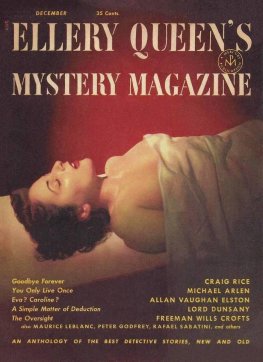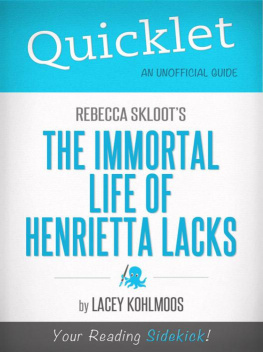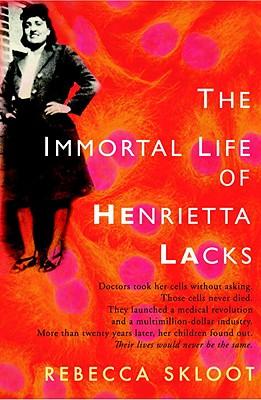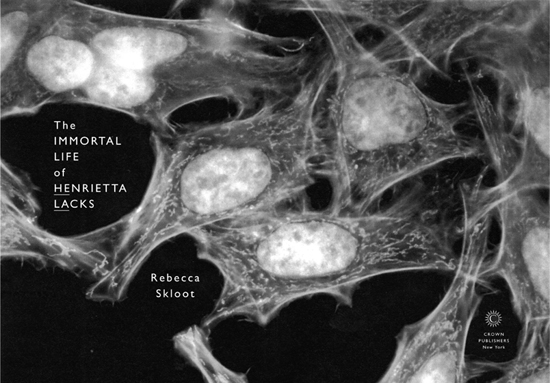M ORE P RAISE FOR
The IMMORTAL LIFE of HE NRIETTA LA CKS
No one can say exactly where Henrietta Lacks is buried: during the many years Rebecca Skloot spent working on this book, even Lackss hometown of Clover, Virginia, disappeared. But that did not stop Skloot in her quest to exhume, and resurrect, the story of her heroine and her family. What this important, invigorating book lays bare is how easily science can do wrong, especially to the poor. The issues evoked here are giant: who owns our bodies, the use and misuse of medical authority, the unhealed wounds of slavery and Skloot, with clarity and compassion, helps us take the long view. This is exactly the sort of story that books were made to tellthorough, detailed, quietly passionate, and full of revelation.
TED CONOVER , author of Newjack and The Routes of Man
Its extremely rare when a reporters passion finds its match in a story. Rarer still when the people in that story courageously join that reporter in the search for what we most need to know about ourselves. When this occurs with a moral journalist who is also a true writera human being with a heart capable of holding all of lifes damage and joythe stars have aligned. This is an extraordinary gift of a book, beautiful and devastatinga work of outstanding literary reportage. Read it! Its the best you will find in many, many years.
ADRIAN NICOLE LEBLANC , author of Random Family
The Immortal Life of Henrietta Lacks brings to mind the work of Philip K. Dick and Edgar Allan Poe. But this tale is true. Rebecca Skloot explores the racism and greed, the idealism and faith in science that helped to save thousands of lives but nearly destroyed a family. This is an extraordinary book, haunting and beautifully told.
ERIC SCHLOSSER , author of Fast Food Nation
Rebecca Skloot has written a marvelous book so original that it defies easy description. She traces the surreal journey that a tiny patch of cells belonging to Henrietta Lackss body took to the forefront of science. At the same time, she tells the story of Lacks and her familywrestling the storms of the late twentieth century in Americawith rich detail, wit, and humanity. The more we read, the more we realize that these are not two separate stories, but one tapestry. Its part The Wire, part The Lives of the Cell, and all fascinating.
CARL ZIMMER , author of Microcosm
For my family:
My parents, Betsy and Floyd; their spouses, Terry and Beverly;
my brother and sister-in-law, Matt and Renee;
and my wonderful nephews, Nick and Justin.
They all did without me for far too long because of this book,
but never stopped believing in it, or me.
And in loving memory of my grandfather,
James Robert Lee (19122003),
who treasured books more than anyone Ive known.
Contents
Part One
Part Two
Part Three
38.
A Few Words About This Book
T his is a work of nonfiction. No names have been changed, no characters invented, no events fabricated. While writing this book, I conducted more than a thousand hours of interviews with family and friends of Henrietta Lacks, as well as with lawyers, ethicists, scientists, and journalists whove written about the Lacks family. I also relied on extensive archival photos and documents, scientific and historical research, and the personal journals of Henriettas daughter, Deborah Lacks.
Ive done my best to capture the language with which each person spoke and wrote: dialogue appears in native dialects; passages from diaries and other personal writings are quoted exactly as written. As one of Henriettas relatives said to me, If you pretty up how people spoke and change the things they said, thats dishonest. Its taking away their lives, their experiences, and their selves. In many places Ive adopted the words interviewees used to describe their worlds and experiences. In doing so, Ive used the language of their times and backgrounds, including words such as colored. Members of the Lacks family often referred to Johns Hopkins as John Hopkin, and Ive kept their usage when theyre speaking. Anything written in the first person in Deborah Lackss voice is a quote of her speaking, edited for length and occasionally clarity.
Since Henrietta Lacks died decades before I began writing this book, I relied on interviews, legal documents, and her medical records to re-create scenes from her life. In those scenes, dialogue is either deduced from the written record or quoted verbatim as it was recounted to me in an interview. Whenever possible I conducted multiple interviews with multiple sources to ensure accuracy. The extract from Henriettas medical record in is a summary of many disparate notations.
The word HeLa, used to refer to the cells grown from Henrietta Lackss cervix, occurs throughout the book. It is pronounced hee-lah.
About chronology: Dates for scientific research refer to when the research was conducted, not when it was published. In some cases those dates are approximate because there is no record of exact start dates. Also, because I move back and forth between multiple stories, and scientific discoveries occur over many years, there are places in the book where, for the sake of clarity, I describe scientific discoveries sequentially, even though they took place during the same general period of time.
The history of Henrietta Lacks and the HeLa cells raises important issues regarding science, ethics, race, and class; Ive done my best to present them clearly within the narrative of the Lacks story, and Ive included an afterword addressing the current legal and ethical debate surrounding tissue ownership and research. There is much more to say on all the issues, but that is beyond the scope of this book, so I will leave it for scholars and experts in the field to address. I hope readers will forgive any omissions.
We must not see any person as an abstraction.
Instead, we must see in every person a universe with its own secrets,
with its own treasures, with its own sources of anguish,
and with some measure of triumph.
E LIE W IESEL
from The Nazi Doctors and the Nuremberg Code
PROLOGUE
The Woman in the Photograph
T heres a photo on my wall of a woman Ive never met, its left corner torn and patched together with tape. She looks straight into the camera and smiles, hands on hips, dress suit neatly pressed, lips painted deep red. Its the late 1940s and she hasnt yet reached the age of thirty. Her light brown skin is smooth, her eyes still young and playful, oblivious to the tumor growing inside hera tumor that would leave her five children motherless and change the future of medicine. Beneath the photo, a caption says her name is Henrietta Lacks, Helen Lane or Helen Larson.
No one knows who took that picture, but its appeared hundreds of times in magazines and science textbooks, on blogs and laboratory walls. Shes usually identified as Helen Lane, but often she has no name at all. Shes simply called HeLa, the code name given to the worlds first immortal human cellsher cells, cut from her cervix just months before she died.
Her real name is Henrietta Lacks.












